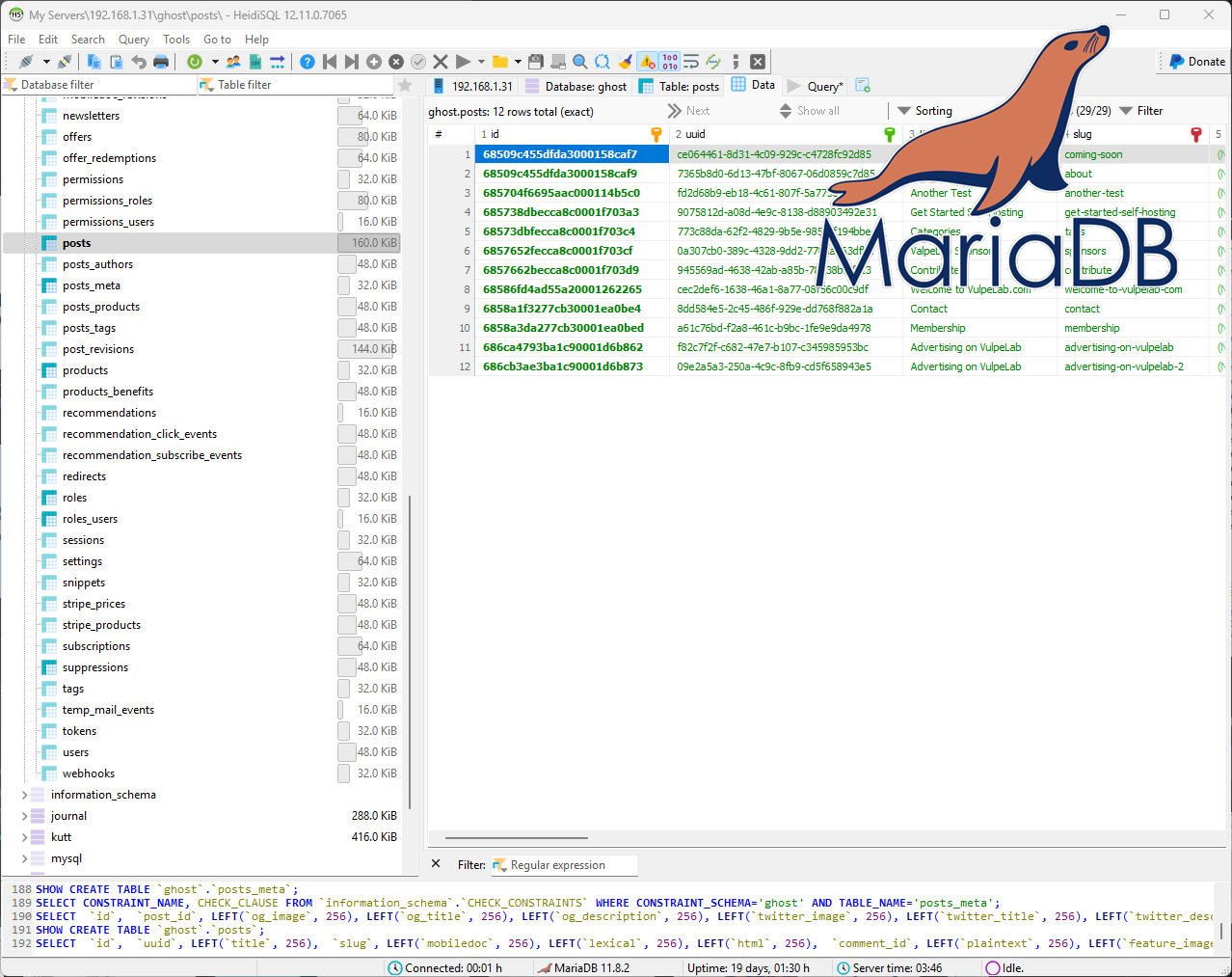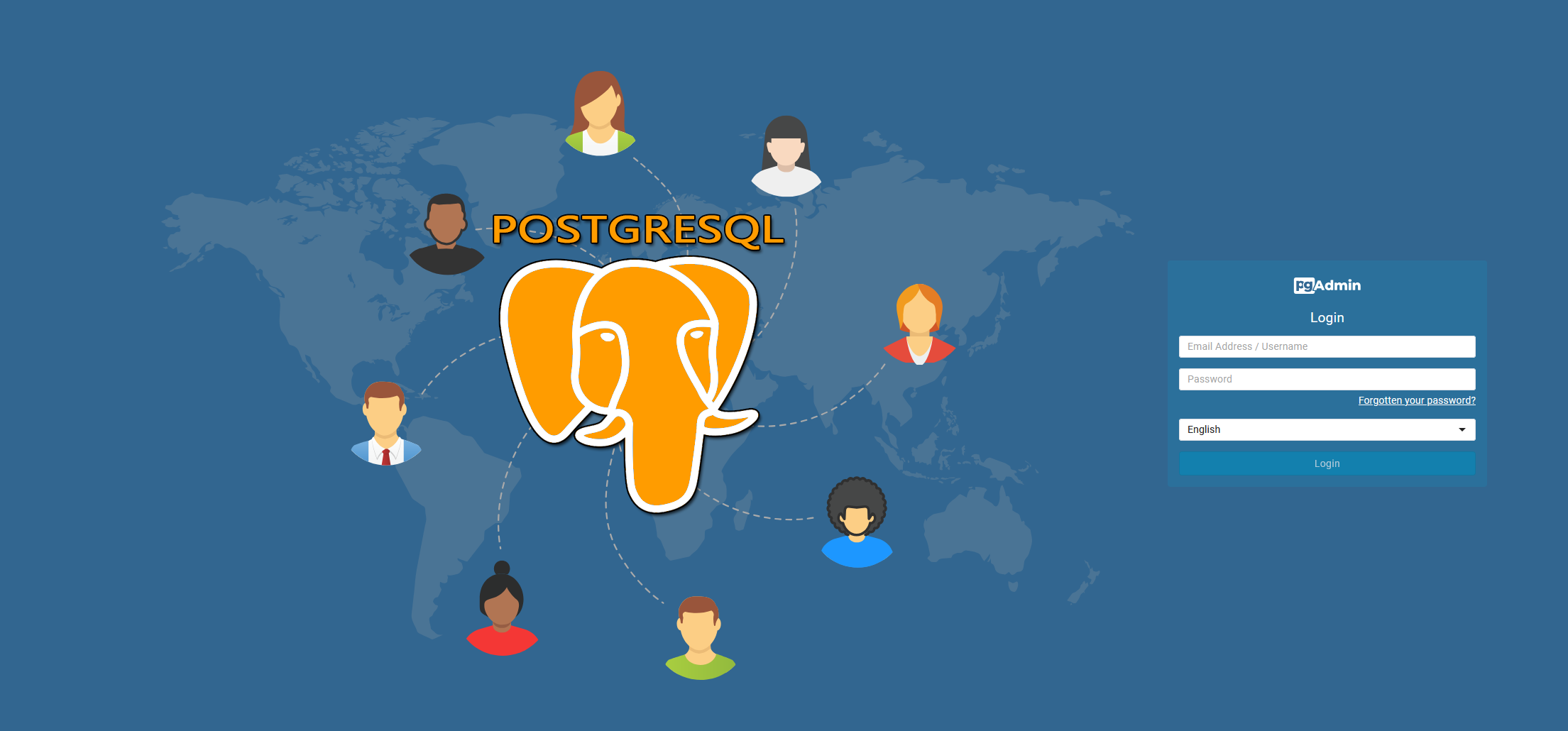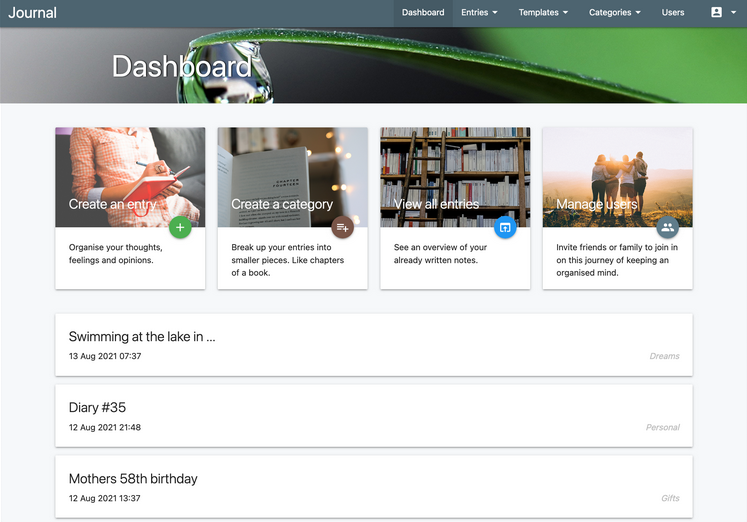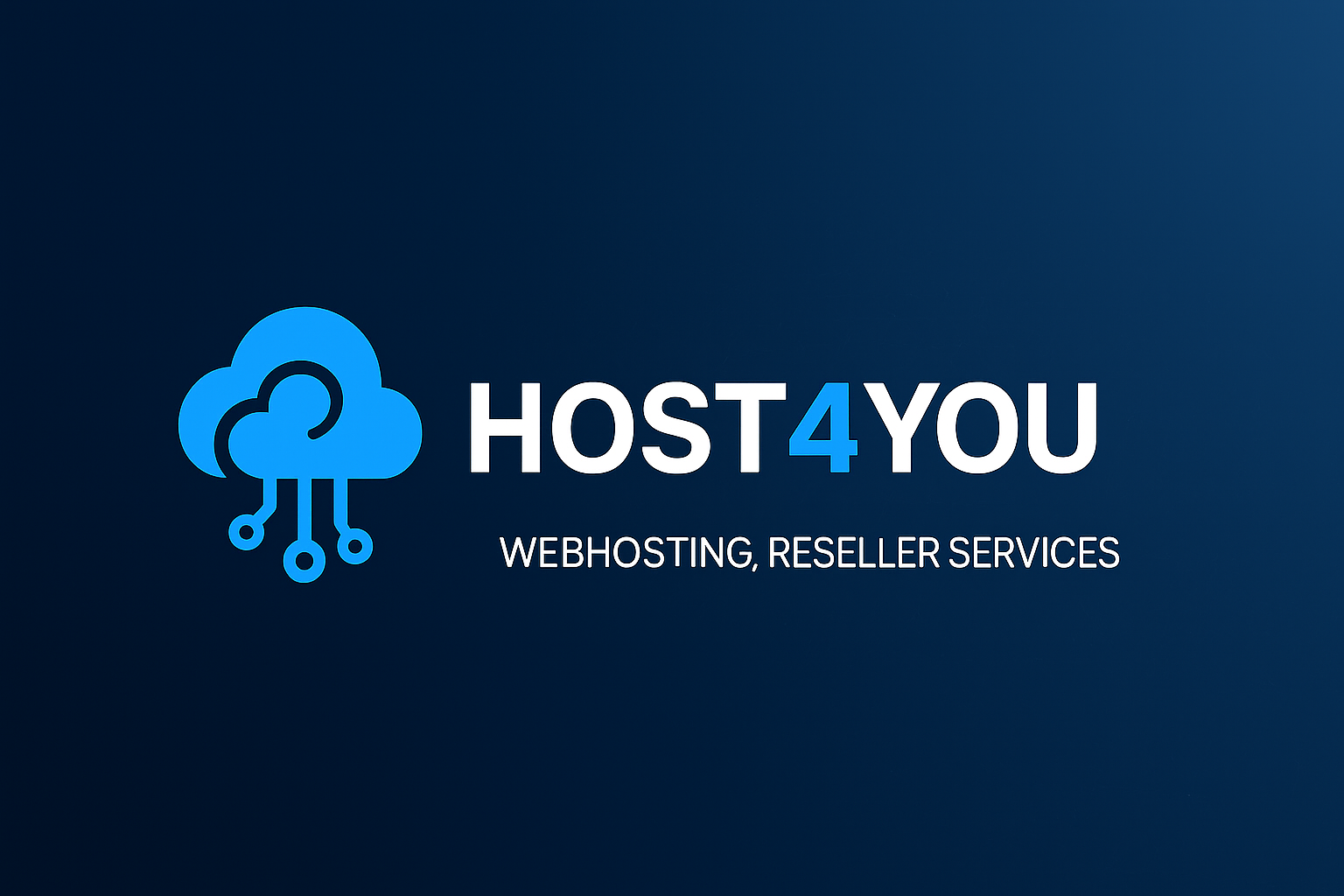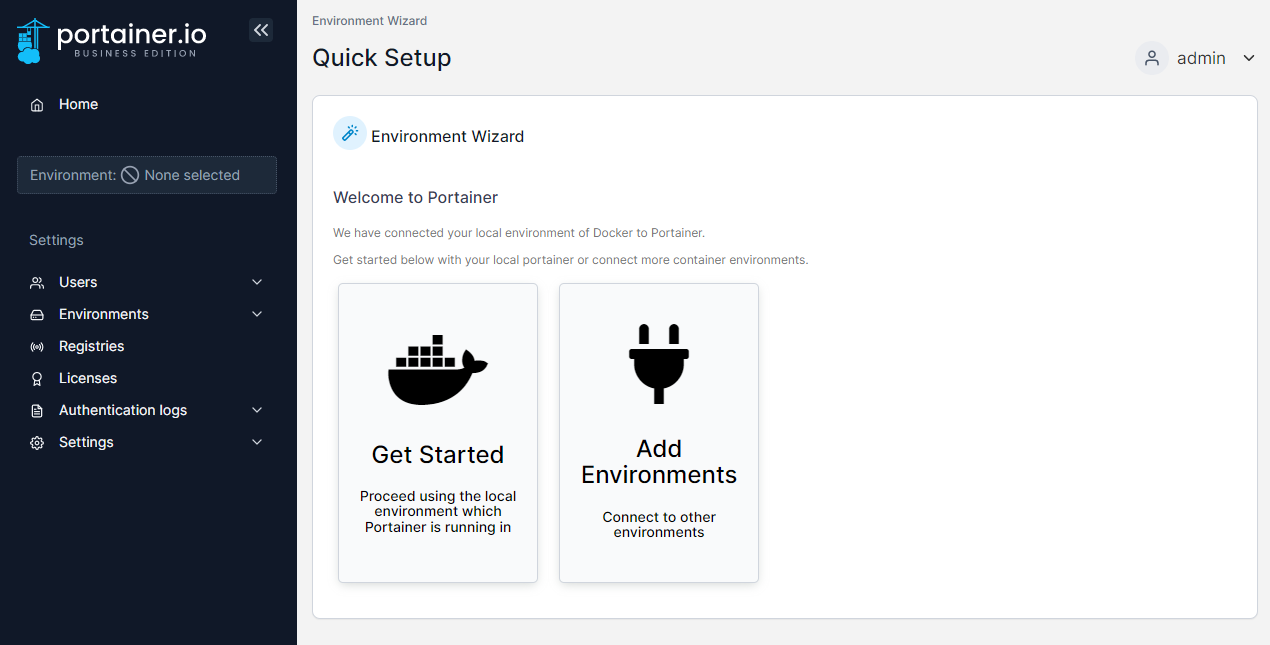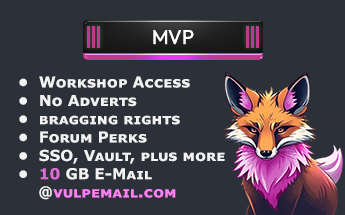All Activity
- Earlier
-
Docker: MariaDB
 What we think of MariaDB -Without going into too much detail, MariaDB is a lightweight and versatile database that originated as a fork of MySQL. It’s popular for its efficient performance and flexible storage options, making it a strong alternative to both MySQL and PostgreSQL. Many of our websites run on MySQL, and several of our VulpeLab Docker stacks also make use of MariaDB. About MariaDB -MariaDB Server is one of the most popular database servers in the world. It’s made by the original developers of MySQL and guaranteed to stay open source. MariaDB Server turns data into structured information in a wide array of applications, ranging from banking to websites. Originally designed as enhanced, drop-in replacement for MySQL, MariaDB Server is used because it is fast, scalable and robust, with a rich ecosystem of storage engines, plugins and many other tools make it very versatile for a wide variety of use cases. Feature highlightsMySQL compatible – Can easily replace MySQL with minimal or no changes. Multiple storage engines – Choose the best for your workload (InnoDB, Aria, MyRocks, ColumnStore, Spider, etc.). Advanced SQL features – JSON support, window functions, CTEs, dynamic/virtual columns, GIS data. Flexible schema changes – Add or change columns online with minimal downtime. Strong security – Role-based access, encryption (at rest & in transit), audit logging, data masking. Scalable & high availability – Replication, Galera Cluster, sharding, parallel queries, MaxScale for load balancing and failover. Backup & recovery – Full/incremental backups, point-in-time recovery, Flashback to undo transactions. Open source & community-driven – Transparent development, frequent updates, large active community. Stack - Tested in Portainerservices: mariadb: image: mariadb:latest container_name: MariaDB volumes: - /containers/mariadb:/var/lib/mysql:rw environment: - MARIADB_ROOT_PASSWORD=VulpeLab ports: - "3306:3306" restart: always Docker Source:https://hub.docker.com/_/mariadb
What we think of MariaDB -Without going into too much detail, MariaDB is a lightweight and versatile database that originated as a fork of MySQL. It’s popular for its efficient performance and flexible storage options, making it a strong alternative to both MySQL and PostgreSQL. Many of our websites run on MySQL, and several of our VulpeLab Docker stacks also make use of MariaDB. About MariaDB -MariaDB Server is one of the most popular database servers in the world. It’s made by the original developers of MySQL and guaranteed to stay open source. MariaDB Server turns data into structured information in a wide array of applications, ranging from banking to websites. Originally designed as enhanced, drop-in replacement for MySQL, MariaDB Server is used because it is fast, scalable and robust, with a rich ecosystem of storage engines, plugins and many other tools make it very versatile for a wide variety of use cases. Feature highlightsMySQL compatible – Can easily replace MySQL with minimal or no changes. Multiple storage engines – Choose the best for your workload (InnoDB, Aria, MyRocks, ColumnStore, Spider, etc.). Advanced SQL features – JSON support, window functions, CTEs, dynamic/virtual columns, GIS data. Flexible schema changes – Add or change columns online with minimal downtime. Strong security – Role-based access, encryption (at rest & in transit), audit logging, data masking. Scalable & high availability – Replication, Galera Cluster, sharding, parallel queries, MaxScale for load balancing and failover. Backup & recovery – Full/incremental backups, point-in-time recovery, Flashback to undo transactions. Open source & community-driven – Transparent development, frequent updates, large active community. Stack - Tested in Portainerservices: mariadb: image: mariadb:latest container_name: MariaDB volumes: - /containers/mariadb:/var/lib/mysql:rw environment: - MARIADB_ROOT_PASSWORD=VulpeLab ports: - "3306:3306" restart: always Docker Source:https://hub.docker.com/_/mariadb -
Docker: PostgreSQL & PGAdmin
 Stacks: Subscribers Workshop: PostgreSQL Stacks: Subscribers Workshop: pgAdminThe subscriber workshop comes with a different stack version of PostgreSQL and PGAdmin compared to the open workshop counterpart. What we think of PostgreSQL -Without going into too much detail, PostgreSQL is a highly versatile and secure database that's used in many of the Docker stacks we've submitted on the VulpeLab website. It competes effectively with other popular systems like MySQL and MariaDB, offering top-tier performance and robust security. Many of our stacks will reference this thread for further information. About Journal -PostgreSQL is a powerful, open source object-relational database system that uses and extends the SQL language combined with many features that safely store and scale the most complicated data workloads. The origins of PostgreSQL date back to 1986 as part of the POSTGRES project at the University of California at Berkeley and has more than 35 years of active development on the core platform. Feature highlightsOpen Source & Actively Maintained SQL Standards Compliance Extensible Architecture Advanced Indexing & Optimization High Performance ACID Compliance & MVCC Robust Security Replication & Recovery Cross-Platform & Language Support Internationalization & Timezone Awareness Stack - Tested in Portainerservices: db: container_name: PostgreSQL image: postgres mem_limit: 256m cpu_shares: 768 healthcheck: test: ["CMD", "pg_isready", "-q", "-d", "postgres", "-U", "postgres"] environment: POSTGRES_PASSWORD: [CHANGE PASSWORD / MAKE IT 32 LENGTH] POSTGRES_DB: db PUID: 1000 PGID: 1000 volumes: - ./postgresql:/var/lib/postgresql/data:rw ports: - 5432:5432 restart: always pgadmin: container_name: pgAdmin image: dpage/pgadmin4:latest mem_limit: 256m cpu_shares: 768 healthcheck: test: wget --no-verbose --tries=1 --spider http://localhost:5050 environment: PGADMIN_DEFAULT_EMAIL: Your-own-email@-address PGADMIN_DEFAULT_PASSWORD: [CHANGE PASSWORD] PGADMIN_LISTEN_PORT: 5050 ports: - 2660:5050 volumes: - ./postgresadmin:/var/lib/pgadmin:rw restart: on-failure:5 Troubleshooting Password Recovery (E-mail Not Sending)If you are experiencing issues with password recovery (for example, the recovery e-mail is not being sent), the problem is usually related to your e-mail configuration inside the Docker container. To resolve this, you’ll need to update the container settings and make the necessary adjustments. Our subscribers have access to a detailed step-by-step guide with the exact configuration changes required. This includes: How to access and edit the container environment variables What SMTP settings need to be updated Common issues and fixes for e-mail delivery from within Docker Testing your configuration to confirm e-mails are working By following the guide, you’ll be able to restore password recovery functionality quickly and ensure your users receive e-mail notifications as expected. Docker Source:https://hub.docker.com/_/postgres https://hub.docker.com/r/dpage/pgadmin4/
Stacks: Subscribers Workshop: PostgreSQL Stacks: Subscribers Workshop: pgAdminThe subscriber workshop comes with a different stack version of PostgreSQL and PGAdmin compared to the open workshop counterpart. What we think of PostgreSQL -Without going into too much detail, PostgreSQL is a highly versatile and secure database that's used in many of the Docker stacks we've submitted on the VulpeLab website. It competes effectively with other popular systems like MySQL and MariaDB, offering top-tier performance and robust security. Many of our stacks will reference this thread for further information. About Journal -PostgreSQL is a powerful, open source object-relational database system that uses and extends the SQL language combined with many features that safely store and scale the most complicated data workloads. The origins of PostgreSQL date back to 1986 as part of the POSTGRES project at the University of California at Berkeley and has more than 35 years of active development on the core platform. Feature highlightsOpen Source & Actively Maintained SQL Standards Compliance Extensible Architecture Advanced Indexing & Optimization High Performance ACID Compliance & MVCC Robust Security Replication & Recovery Cross-Platform & Language Support Internationalization & Timezone Awareness Stack - Tested in Portainerservices: db: container_name: PostgreSQL image: postgres mem_limit: 256m cpu_shares: 768 healthcheck: test: ["CMD", "pg_isready", "-q", "-d", "postgres", "-U", "postgres"] environment: POSTGRES_PASSWORD: [CHANGE PASSWORD / MAKE IT 32 LENGTH] POSTGRES_DB: db PUID: 1000 PGID: 1000 volumes: - ./postgresql:/var/lib/postgresql/data:rw ports: - 5432:5432 restart: always pgadmin: container_name: pgAdmin image: dpage/pgadmin4:latest mem_limit: 256m cpu_shares: 768 healthcheck: test: wget --no-verbose --tries=1 --spider http://localhost:5050 environment: PGADMIN_DEFAULT_EMAIL: Your-own-email@-address PGADMIN_DEFAULT_PASSWORD: [CHANGE PASSWORD] PGADMIN_LISTEN_PORT: 5050 ports: - 2660:5050 volumes: - ./postgresadmin:/var/lib/pgadmin:rw restart: on-failure:5 Troubleshooting Password Recovery (E-mail Not Sending)If you are experiencing issues with password recovery (for example, the recovery e-mail is not being sent), the problem is usually related to your e-mail configuration inside the Docker container. To resolve this, you’ll need to update the container settings and make the necessary adjustments. Our subscribers have access to a detailed step-by-step guide with the exact configuration changes required. This includes: How to access and edit the container environment variables What SMTP settings need to be updated Common issues and fixes for e-mail delivery from within Docker Testing your configuration to confirm e-mails are working By following the guide, you’ll be able to restore password recovery functionality quickly and ensure your users receive e-mail notifications as expected. Docker Source:https://hub.docker.com/_/postgres https://hub.docker.com/r/dpage/pgadmin4/ -
Docker: Journal
 Stacks: Subscribers Workshop: Journal What we think of Journal -I was looking for a better way to keep track of personal, medical, and other important information that I usually carry around in my head. Handwriting everything wasn’t ideal, especially since my handwriting isn't the greatest, so I wanted a digital solution that would be more organized, accessible, and easier to maintain. This has turned out to be a great way to capture and manage the details that matter most to me. About Journal -Journal is a privacy first, self-hosted digital log book. It is designed to be accessible anywhere you go, allowing you to organize your thoughts, feelings and opinions in one place. Your Journals are stored with AES 256 encryption using your own password as the encryption key, resulting in a protected and inaccessible log book from outsiders. Feature highlightsMobile friendly Advanced content editor (supports image upload) Organise entries using categories Create predefined sets of templates for entries Entries, Templates and Images have AES-256 Encryption Order your favorite categories to appear on the top Quickly add entries by enabling the quick-add widget Advanced search Create accounts for users Export entries Stack -version: '2.3' services: journal: image: samihsoylu/journal restart: unless-stopped ports: - 8080:80 depends_on: - mariadb environment: - DB_HOST=mariadb - DB_USERNAME=journal - DB_PASSWORD=journal - DB_SCHEMA=journal - DEBUG_MODE=true - USERNAME=demouser - PASSWORD=demopass - [email protected] mariadb: image: mariadb environment: - MARIADB_RANDOM_ROOT_PASSWORD=yes - MARIADB_USER=journal - MARIADB_PASSWORD=journal - MARIADB_DATABASE=journal volumes: - db_data:/var/lib/mysql volumes: db_data: Docker Source:https://github.com/samihsoylu/journal
Stacks: Subscribers Workshop: Journal What we think of Journal -I was looking for a better way to keep track of personal, medical, and other important information that I usually carry around in my head. Handwriting everything wasn’t ideal, especially since my handwriting isn't the greatest, so I wanted a digital solution that would be more organized, accessible, and easier to maintain. This has turned out to be a great way to capture and manage the details that matter most to me. About Journal -Journal is a privacy first, self-hosted digital log book. It is designed to be accessible anywhere you go, allowing you to organize your thoughts, feelings and opinions in one place. Your Journals are stored with AES 256 encryption using your own password as the encryption key, resulting in a protected and inaccessible log book from outsiders. Feature highlightsMobile friendly Advanced content editor (supports image upload) Organise entries using categories Create predefined sets of templates for entries Entries, Templates and Images have AES-256 Encryption Order your favorite categories to appear on the top Quickly add entries by enabling the quick-add widget Advanced search Create accounts for users Export entries Stack -version: '2.3' services: journal: image: samihsoylu/journal restart: unless-stopped ports: - 8080:80 depends_on: - mariadb environment: - DB_HOST=mariadb - DB_USERNAME=journal - DB_PASSWORD=journal - DB_SCHEMA=journal - DEBUG_MODE=true - USERNAME=demouser - PASSWORD=demopass - [email protected] mariadb: image: mariadb environment: - MARIADB_RANDOM_ROOT_PASSWORD=yes - MARIADB_USER=journal - MARIADB_PASSWORD=journal - MARIADB_DATABASE=journal volumes: - db_data:/var/lib/mysql volumes: db_data: Docker Source:https://github.com/samihsoylu/journal -
Host4You
 Host4You begun offering a range of services starting from Web Hosting, Reselling to Server Management where our staff provide all our clients the best possible hosting experience by making your life easier when it comes to technical issues. We are a established hosting provider backed by a team with over 15 years of industry experience. At Host4You, we offer a comprehensive range of services, including Web Hosting, Reseller Hosting, and Server Management. Our goal is to provide our clients with the best possible hosting experience by simplifying technical challenges and ensuring seamless performance. What sets Host4You apart is our commitment to genuine support. Unlike many providers, we go beyond basic hosting - we actively assist in resolving website-related issues. Whether it’s a misconfiguration affecting your site or a dedicated server requiring maintenance, we believe you deserve a reliable, fully functional service. Visit Endorsement: www.host4you.co.uk Web Hosting Packages Basic Package – £5.49/moPerfect for beginners exploring the world of web hosting. The Basic package provides ample space to host up to five websites under a single account — an ideal choice for personal projects or small-scale sites. Advanced Package – £10.99/moDesigned for experienced users who need more flexibility and resources than the Basic plan. The Advanced package offers increased capacity and performance, giving you the room to expand and manage more demanding websites with ease. Professional Package – £16.49/moTailored for high-traffic or resource-intensive websites. This package delivers generous storage, database capacity, and robust email support — ensuring smooth operation for professional-grade hosting environments. Business Package – £21.99/moBuilt for small to medium-sized businesses, this plan provides the perfect balance of resources and scalability. Run multiple websites, manage extensive data, and grow your digital presence — with storage being your only constraint. Reseller Packages Basic Reseller Plan – £21.95/moIdeal for those just entering the reseller hosting market. This plan allows you to manage up to 20 accounts with essential features, including shared CPU & RAM, 25 GB SSD storage, and enhanced security. Includes cPanel/WHM, free SSL certificates, daily offsite backups, and a one-click application installer — all backed by 24/7 basic support. Online Store Plan (Best Plan) – £35.95/moPerfect for growing resellers or online businesses. Manage up to 40 accounts with double the storage (50 GB SSD), enhanced performance, and moderate support around the clock. Enjoy all the features of the Basic plan — plus more space, scalability, and reliability for busy or eCommerce-focused clients. Pro Reseller Plan – £49.95/moBuilt for serious resellers with larger client bases or more demanding hosting needs. Host up to 60 accounts with 75 GB SSD storage and full access to all included features. Benefit from enhanced security, daily backups, cPanel/WHM, and comprehensive 24/7 support — the ultimate package for professionals who want performance without compromise. Host4You Uses cPanel / WHM & SoftaculousHave a quick read about what these applications do for you. What is cPanel?cPanel is a powerful and widely used web hosting control panel that provides a graphical user interface (GUI) and automation tools to simplify the process of hosting websites on a server. It allows website owners, administrators, and resellers to easily manage their web hosting environment without needing extensive technical knowledge. What cPanel Does:Website Management: Manage website files, domains, subdomains, and redirections with ease. Email Management: Create and manage email accounts, forwarders, autoresponders, spam filters, and webmail access. Database Administration: Create and manage MySQL and PostgreSQL databases using tools like phpMyAdmin. Security Controls: Includes SSL certificate management, password-protected directories, IP blocking, and more. Backup & Restore: Automate and manage full or partial backups of your website, files, and databases. Application Installation: Easily install popular applications (like WordPress, Joomla, or Magento) using integrated auto-installers like Softaculous or cPanel’s own tool. Resource Monitoring: Track bandwidth usage, disk space, CPU, and memory usage through a clean dashboard. For Resellers and Hosting Providers:When paired with WHM (Web Host Manager), cPanel enables hosting providers to: Create and manage multiple cPanel accounts Allocate resources (like disk space and bandwidth) Monitor server performance Offer white-labeled hosting services to clients What is Softaculous?Softaculous is a powerful auto-installer integrated into popular web hosting control panels like cPanel, Plesk, DirectAdmin, and more. It allows users to install a wide variety of web applications with just a few clicks — no technical expertise required. It’s especially popular with web hosting providers, developers, and website owners for its convenience, speed, and extensive library of applications. What Softaculous Does:One-Click App Installations: Instantly install over 400+ popular web applications, including: Content Management Systems (CMS): WordPress, Joomla, Drupal E-Commerce Platforms: Magento, PrestaShop, OpenCart Forums: phpBB, SMF Blogs, wikis, ad management, ERP systems, and more Automated Updates: Automatically update installed applications to their latest versions to keep your website secure and up to date. Backups & Restoration: Create and restore backups of installed applications directly from your control panel. Staging & Cloning: Easily create a staging environment for testing changes or clone an existing site to a new domain or subdomain. User-Friendly Interface: Clean, intuitive interface that integrates seamlessly into control panels like cPanel, allowing even non-technical users to manage their apps with ease. Why It’s Useful:Saves time and simplifies installation of web apps Reduces technical barriers for website creation Ideal for beginners, developers, and resellers Trusted by thousands of hosting providers worldwide Endorsed By
Host4You begun offering a range of services starting from Web Hosting, Reselling to Server Management where our staff provide all our clients the best possible hosting experience by making your life easier when it comes to technical issues. We are a established hosting provider backed by a team with over 15 years of industry experience. At Host4You, we offer a comprehensive range of services, including Web Hosting, Reseller Hosting, and Server Management. Our goal is to provide our clients with the best possible hosting experience by simplifying technical challenges and ensuring seamless performance. What sets Host4You apart is our commitment to genuine support. Unlike many providers, we go beyond basic hosting - we actively assist in resolving website-related issues. Whether it’s a misconfiguration affecting your site or a dedicated server requiring maintenance, we believe you deserve a reliable, fully functional service. Visit Endorsement: www.host4you.co.uk Web Hosting Packages Basic Package – £5.49/moPerfect for beginners exploring the world of web hosting. The Basic package provides ample space to host up to five websites under a single account — an ideal choice for personal projects or small-scale sites. Advanced Package – £10.99/moDesigned for experienced users who need more flexibility and resources than the Basic plan. The Advanced package offers increased capacity and performance, giving you the room to expand and manage more demanding websites with ease. Professional Package – £16.49/moTailored for high-traffic or resource-intensive websites. This package delivers generous storage, database capacity, and robust email support — ensuring smooth operation for professional-grade hosting environments. Business Package – £21.99/moBuilt for small to medium-sized businesses, this plan provides the perfect balance of resources and scalability. Run multiple websites, manage extensive data, and grow your digital presence — with storage being your only constraint. Reseller Packages Basic Reseller Plan – £21.95/moIdeal for those just entering the reseller hosting market. This plan allows you to manage up to 20 accounts with essential features, including shared CPU & RAM, 25 GB SSD storage, and enhanced security. Includes cPanel/WHM, free SSL certificates, daily offsite backups, and a one-click application installer — all backed by 24/7 basic support. Online Store Plan (Best Plan) – £35.95/moPerfect for growing resellers or online businesses. Manage up to 40 accounts with double the storage (50 GB SSD), enhanced performance, and moderate support around the clock. Enjoy all the features of the Basic plan — plus more space, scalability, and reliability for busy or eCommerce-focused clients. Pro Reseller Plan – £49.95/moBuilt for serious resellers with larger client bases or more demanding hosting needs. Host up to 60 accounts with 75 GB SSD storage and full access to all included features. Benefit from enhanced security, daily backups, cPanel/WHM, and comprehensive 24/7 support — the ultimate package for professionals who want performance without compromise. Host4You Uses cPanel / WHM & SoftaculousHave a quick read about what these applications do for you. What is cPanel?cPanel is a powerful and widely used web hosting control panel that provides a graphical user interface (GUI) and automation tools to simplify the process of hosting websites on a server. It allows website owners, administrators, and resellers to easily manage their web hosting environment without needing extensive technical knowledge. What cPanel Does:Website Management: Manage website files, domains, subdomains, and redirections with ease. Email Management: Create and manage email accounts, forwarders, autoresponders, spam filters, and webmail access. Database Administration: Create and manage MySQL and PostgreSQL databases using tools like phpMyAdmin. Security Controls: Includes SSL certificate management, password-protected directories, IP blocking, and more. Backup & Restore: Automate and manage full or partial backups of your website, files, and databases. Application Installation: Easily install popular applications (like WordPress, Joomla, or Magento) using integrated auto-installers like Softaculous or cPanel’s own tool. Resource Monitoring: Track bandwidth usage, disk space, CPU, and memory usage through a clean dashboard. For Resellers and Hosting Providers:When paired with WHM (Web Host Manager), cPanel enables hosting providers to: Create and manage multiple cPanel accounts Allocate resources (like disk space and bandwidth) Monitor server performance Offer white-labeled hosting services to clients What is Softaculous?Softaculous is a powerful auto-installer integrated into popular web hosting control panels like cPanel, Plesk, DirectAdmin, and more. It allows users to install a wide variety of web applications with just a few clicks — no technical expertise required. It’s especially popular with web hosting providers, developers, and website owners for its convenience, speed, and extensive library of applications. What Softaculous Does:One-Click App Installations: Instantly install over 400+ popular web applications, including: Content Management Systems (CMS): WordPress, Joomla, Drupal E-Commerce Platforms: Magento, PrestaShop, OpenCart Forums: phpBB, SMF Blogs, wikis, ad management, ERP systems, and more Automated Updates: Automatically update installed applications to their latest versions to keep your website secure and up to date. Backups & Restoration: Create and restore backups of installed applications directly from your control panel. Staging & Cloning: Easily create a staging environment for testing changes or clone an existing site to a new domain or subdomain. User-Friendly Interface: Clean, intuitive interface that integrates seamlessly into control panels like cPanel, allowing even non-technical users to manage their apps with ease. Why It’s Useful:Saves time and simplifies installation of web apps Reduces technical barriers for website creation Ideal for beginners, developers, and resellers Trusted by thousands of hosting providers worldwide Endorsed By -
Portainer Installation
 Guides: Subscribers Workshop: Installing Portainer DeploymentFirst, create the volume that Portainer Server will use to store its database: docker volume create portainer_data Then, download and install the Portainer Server container: docker run -d -p 8000:8000 -p 9443:9443 --name portainer --restart=always -v /var/run/docker.sock:/var/run/docker.sock -v portainer_data:/data portainer/portainer-ce:ltsBy default, Portainer generates and uses a self-signed SSL certificate to secure port 9443. Portainer Server has now been installed. You can check to see whether the Portainer Server container has started by running docker ps: root@server:~# docker ps CONTAINER ID IMAGE COMMAND CREATED STATUS PORTS NAMES de5b28eb2fa9 portainer/portainer-ce:lts "/portainer" 2 weeks ago Up 9 days 0.0.0.0:8000->8000/tcp, :::8000->8000/tcp, 0.0.0.0:9443->9443/tcp, :::9443->9443/tcp portainer If you don't know the host machine IP, you can use the following command to output the information. ip addr Logging InNow that the installation is complete, you can log into your Portainer Server instance by opening a web browser and going to: https://localhost:9443 https://192.168.1.150:9443Replace localhost with the relevant IP address or FQDN if needed, and adjust the port if you changed it earlier. You will be presented with the initial setup page for Portainer Server. Initial setupOnce the Portainer Server has been deployed, and you have navigated to the instance's URL, you are ready for the initial setup. Creating the first userYour first user will be an administrator. The username defaults to admin but you can change it if you prefer. The password must be at least 12 characters long and meet the listed password requirements. The installation process automatically detects your local environment and sets it up for you. If you want to add additional environments to manage with this Portainer instance, click Add Environments. Otherwise, click Get Started to start using Portainer!
Guides: Subscribers Workshop: Installing Portainer DeploymentFirst, create the volume that Portainer Server will use to store its database: docker volume create portainer_data Then, download and install the Portainer Server container: docker run -d -p 8000:8000 -p 9443:9443 --name portainer --restart=always -v /var/run/docker.sock:/var/run/docker.sock -v portainer_data:/data portainer/portainer-ce:ltsBy default, Portainer generates and uses a self-signed SSL certificate to secure port 9443. Portainer Server has now been installed. You can check to see whether the Portainer Server container has started by running docker ps: root@server:~# docker ps CONTAINER ID IMAGE COMMAND CREATED STATUS PORTS NAMES de5b28eb2fa9 portainer/portainer-ce:lts "/portainer" 2 weeks ago Up 9 days 0.0.0.0:8000->8000/tcp, :::8000->8000/tcp, 0.0.0.0:9443->9443/tcp, :::9443->9443/tcp portainer If you don't know the host machine IP, you can use the following command to output the information. ip addr Logging InNow that the installation is complete, you can log into your Portainer Server instance by opening a web browser and going to: https://localhost:9443 https://192.168.1.150:9443Replace localhost with the relevant IP address or FQDN if needed, and adjust the port if you changed it earlier. You will be presented with the initial setup page for Portainer Server. Initial setupOnce the Portainer Server has been deployed, and you have navigated to the instance's URL, you are ready for the initial setup. Creating the first userYour first user will be an administrator. The username defaults to admin but you can change it if you prefer. The password must be at least 12 characters long and meet the listed password requirements. The installation process automatically detects your local environment and sets it up for you. If you want to add additional environments to manage with this Portainer instance, click Add Environments. Otherwise, click Get Started to start using Portainer! -
Install/Upgrade/Uninstall Docker
 Guides: Subscribers Workshop: Install/Upgrade/Uninstall Docker If you have tried installing docker to your system but failed to follow the docker.com docs then please do the following. Now before starting, a rule of thumb, make sure your system is up to date. Basic Set-up for installing docker.Step 1. Update the host. $ apt update Step 2. Upgrade the host. $ apt upgrade -y Step 3. Install curl. $ apt install curlStep 3. Install Docker. $ curl -sSL https://get.docker.com | shStep 5 Check if Docker is functioning. $ systemctl status docker Upgrade Docker EngineTo upgrade Docker Engine, download the newer package files and repeat the installation procedure, pointing to the new files. Tip Preview script steps before running. You can run the script with the --dry-run option to learn what steps the script will run when invoked: $ curl -fsSL https://get.docker.com -o get-docker.sh $ sudo sh ./get-docker.sh --dry-run This example downloads the script from https://get.docker.com/ and runs it to install the latest stable release of Docker on Linux: $ curl -fsSL https://get.docker.com -o get-docker.sh $ sudo sh get-docker.sh Executing docker install script, commit: 7cae5f8b0decc17d6571f9f52eb840fbc13b2737 <...> You have now successfully installed and started Docker Engine. The docker service starts automatically on Debian based distributions. On RPM based distributions, such as CentOS, Fedora, RHEL or SLES, you need to start it manually using the appropriate systemctl or service command. As the message indicates, non-root users can't run Docker commands by default. Uninstall Docker EngineUninstall the Docker Engine, CLI, containerd, and Docker Compose packages: $ sudo apt-get purge docker-ce docker-ce-cli containerd.io docker-buildx-plugin docker-compose-plugin docker-ce-rootless-extrasImages, containers, volumes, or custom configuration files on your host aren't automatically removed. To delete all images, containers, and volumes: $ sudo rm -rf /var/lib/docker $ sudo rm -rf /var/lib/containerdRemove source list and keyrings $ sudo rm /etc/apt/sources.list.d/docker.list $ sudo rm /etc/apt/keyrings/docker.asc You have to delete any edited configuration files manually. Referenced: https://docs.docker.com/engine/install/debian/ Guides: Subscribers Workshop: Install/Upgrade/Uninstall Docker
Guides: Subscribers Workshop: Install/Upgrade/Uninstall Docker If you have tried installing docker to your system but failed to follow the docker.com docs then please do the following. Now before starting, a rule of thumb, make sure your system is up to date. Basic Set-up for installing docker.Step 1. Update the host. $ apt update Step 2. Upgrade the host. $ apt upgrade -y Step 3. Install curl. $ apt install curlStep 3. Install Docker. $ curl -sSL https://get.docker.com | shStep 5 Check if Docker is functioning. $ systemctl status docker Upgrade Docker EngineTo upgrade Docker Engine, download the newer package files and repeat the installation procedure, pointing to the new files. Tip Preview script steps before running. You can run the script with the --dry-run option to learn what steps the script will run when invoked: $ curl -fsSL https://get.docker.com -o get-docker.sh $ sudo sh ./get-docker.sh --dry-run This example downloads the script from https://get.docker.com/ and runs it to install the latest stable release of Docker on Linux: $ curl -fsSL https://get.docker.com -o get-docker.sh $ sudo sh get-docker.sh Executing docker install script, commit: 7cae5f8b0decc17d6571f9f52eb840fbc13b2737 <...> You have now successfully installed and started Docker Engine. The docker service starts automatically on Debian based distributions. On RPM based distributions, such as CentOS, Fedora, RHEL or SLES, you need to start it manually using the appropriate systemctl or service command. As the message indicates, non-root users can't run Docker commands by default. Uninstall Docker EngineUninstall the Docker Engine, CLI, containerd, and Docker Compose packages: $ sudo apt-get purge docker-ce docker-ce-cli containerd.io docker-buildx-plugin docker-compose-plugin docker-ce-rootless-extrasImages, containers, volumes, or custom configuration files on your host aren't automatically removed. To delete all images, containers, and volumes: $ sudo rm -rf /var/lib/docker $ sudo rm -rf /var/lib/containerdRemove source list and keyrings $ sudo rm /etc/apt/sources.list.d/docker.list $ sudo rm /etc/apt/keyrings/docker.asc You have to delete any edited configuration files manually. Referenced: https://docs.docker.com/engine/install/debian/ Guides: Subscribers Workshop: Install/Upgrade/Uninstall Docker -
Helper Role

- 10 Places
- 0 Applicants
What on earth is the point of this role, Muahhahahaha. Well to put it in simple terms: Give advice to forum members Offer support - Redirect Members to relevant information Get a fanzy Title 🤟 Increased Forum Benefits Additional Storage Extra Forum Perks Plus more... Verified by VulpeLab -
Community Administrator

- 2 Places
- 0 Applicants
In order to apply for this role, you must have knowledge working with forum based system similar to IPS (Invision Power Suite] or vBulletin Suite. This role will involve managing: All Moderators Vetting Future Moderator Positions Forum Management User Management Must have experience with: Docker Portainer ProxMox / Similar Systems relating to virtual machines Synology (Only applies if you have it] Virtual Private Servers (VPS) or Dedicated Servers Desirable Skills: PHP/HTML Python Script MYSQL/MARIADB or PGSQL If you have any skills not mentioned, feel free to mention it to us, your abilties may have a positive effect on which direction we take our website, be it a minor effect. As VulpeLab covers the above services, having knowledge in them areas is desirable and you will need to provide some examples of your experience. We may ask you to prove your ability by getting you to install your own Virtual Machine - Updating System, Installing Docker and Portainer and Configuring a docker stack. By having this knowledge we can entrust the forums to you and know that you have the ability to support our members and subscribers. -
Head Moderator Role

- 2 Places
- 0 Applicants
We are looking for a couple of moderators to help us manage the inner working of the forums. Look out for posts that might be in the wrong location, or might be breaking the rules. You job will be to manage other moderators whilst also monitoring and managing the forums. -
Moderator Role

- 5 Places
- 0 Applicants
We are looking for a couple of moderators to help us manage the inner working of the forums. Look out for posts that might be in the wrong location, or might be breaking the rules. You job will be to monitor and manage. -
 Andy changed their profile photo
Andy changed their profile photo -
50k Impression Campaign
-
20k Impression Campaign
-
10k Impression Campaign
-
MVP
Product in Subscription
The "MVP" forum membership is £15/month or £165/year and grants the following privileges:
Access to Subscribers Central sub-forum
No banner advertisements on the forum
MVP user group to reflect contribution level
Username text colour to reflect contribution level
Forum Perks
Can store personal messages - No Limit
Can rate topics
Access all of the 'Regulars' features above
Can upload a personal photo - 400Kb max size (200px by 300px)
Upload Storage - No Limit
Can start and administer personal Blog/Journal
Can remove 'edited by' legend from posts
Can hide/delete own topics
50Mb space per post or personal message
Can store personal messages - No Limit
Every Pound that gets contributed to VulpeLab helps us acquire the equipment we need and helps us to provide more services to our members. Or you might want to treat us to a drink or meal each month.
From 15.00 GBP/month -
VIP
Product in Subscription
The "VIP" forum membership is £10/month or £110/year and grants the following privileges:
Access to Subscribers Central sub-forum
No banner advertisements on the forum
VIP user group to reflect contribution level
Username text colour to reflect contribution level
Forum Perks
Can store 1000 personal messages
Can rate topics
Access all of the 'Regulars' features above
Can upload a personal photo - 400Kb max size (200px by 300px)
Upload Storage - 1000MB
Can start and administer personal Blog/Journal
Can remove 'edited by' legend from posts
Can hide/delete own topics
50Mb space per post or personal message
Every Pound that gets contributed to VulpeLab helps us acquire the equipment we need and helps us to provide more services to our members. Or you might want to treat us to a drink or meal each month.
From 10.00 GBP/month -
Contributor
Product in Subscription
The "Contributor" forum membership is £5/month or £55/year and grants the following privileges:
Access to Subscribers Central sub-forum
No banner advertisements on the forum
Contributor user group to reflect contribution level
Username text colour to reflect contribution level
Forum PerksCan store 500 personal messages
Can rate topics
Access all of the 'Regulars' features above
Can upload a personal photo - 200Kb max size (200px by 300px)
Upload Storage - 500MB
Can start and administer personal Blog/Journal
Can remove 'edited by' legend from posts
Can hide own topics
25Mb space per post or personal message
Every Pound that gets contributed to VulpeLab helps us acquire the equipment we need and helps us to provide more services to our members. Or you might want to treat us to a drink or meal each month.
From 5.00 GBP/month




